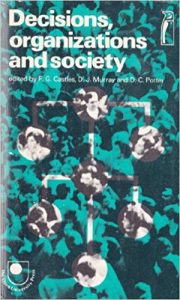50 objects for 50 years. No 10. OU Collected texts
From the start many OU students found access to an academic library difficult. In recognition of this collections of important articles and chapters were collated, bound and posted out to students. Some were co-published, with the OU logo on the cover.
This week’s object has been proposed by Alan Shipman. A former business journalist now teaching and researching at the OU Alan has taught (among other topics) personal finance and his research interests include Chinese multinational business and the foundations of the market economy.
In the below five bullet points Alan Shipman reflects on why Decisions, Organizations and Society: Selected Readings, edited by FG Castles, DJ Murray and DC Potter; Penguin Books in association with the Open University Press, deserves to be an OU symbol 50 years on:
- It’s one of the ‘selected readings’ collections that gave students a whirlwind tour through the classic ideas and authors in a subject area, explained and contextualised by short introductory notes by the editors. These were widely used by other universities, and had a general nonstudent readership, thanks to co-publishing and the availability of cheap paperback editions. Authors featured in the readings include some who were rising to prominence then, and are still influential 50 years on: eg Herbert Simon (management sciences, organisational psychology, economics); Mancur Olson, Robert Dahl, Ralph Miliband (political science), Tom Bottomore (sociology).
- It’s one of the earliest, published in 1971, and is edited by 3 prominent academics who’d already joined the OU (David Murray was Professor of Government, David Potter a Senior Lecturer and Francis Castles a Lecturer in the Faculty of Social Sciences).
- It shows how the OU was, from the start, instrumental in promoting social sciences and breaking through their disciplinary boundaries – the readings focus on topics that transcend these (power, decisionmaking, organisation, hierarchy) and so they mix politics, economics, sociology, cognitive psychology, social psychology and management studies).
- It shows how the OU’s wide audience facilitated partnerships with leading mass-market publishers, including Penguin.
- The editors’ writing style also contains some heroic early attempts to escape the institutionalised sexism of the times. From their introductory definitions: “Two ladies meet in a dark street, whereupon one lady deliberately stops, produces a pistol and demands money from the second lady. There is decision (the first lady could have chosen to walk on down the street), and there is power (the second lady’s behaviour is controlled as a result of her relation with the first lady)…
The three editors.
As well as contributing to Decisions, Organizations and Society: Selected Readings Frank Castles also offered a critique of the organization of the OU itself. Having taught face-to-face in universities in York and Australia he had, on arriving at the OU, to adapt to the system he termed ‘Divide and teach: the new division of labour’, in Jeremy Tunstall, The Open University Opens, 1974. Castles found that the OU’s division of labour, with central academics, local tutors, educational technologists, the BBC, a variety of outside expert advisors, counsellors and specialist summer school teaching staff, led to ‘tensions… suspicion and conflict … bitter disputes … enormously increased work-load’. However, he concluded that it was such role specialization which ‘makes the Open University possible at all’.
David Potter, a Berkeley graduate BA 1954, MA, 1959, gained a PhD from the LSE (1962). He worked at Oakland University in Michigan and published on British imperialism in Asia and post-independence consequences. His first book was Government in Rural India, 1964. He then went to Simon Fraser University, British Columbia, Canada where he earned tenure in 1969. Shortly afterwards, in the same year, 11 members of the 16-strong Political Science, Sociology and Anthropology Department were not granted tenure, which, in effect, meant that they were fired. Potter supported their protest strike and was himself fired. He came to the Open University. He was appointed as a Professor of Political Science in 1989 and had 15 of his books published by 2002, when he was designated a Honorary graduate of the university. On retirement he was made a professor emeritus.
David Murray joined the OU in September 1969 as Professor of Government. He chaired and was a member of several main OU committees before being seconded to the University of the South Pacific between 1975 and 1978. In 1980 he was made Chair of the Examinations and Assessment Committee. Between 1983 and 1988 he was a Pro-Vice-Chancellor. He then helped to set up The Open University of Hong Kong before becoming a Pro-Vice-Chancellor again in 1990–91. He subsequently worked with the Higher Education Quality Council (which became The Quality Assurance Agency for Higher Education) and retired in 1999.
